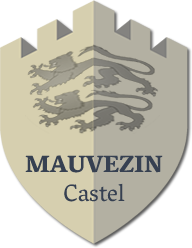Escola G. Febus
Created in 1896
Article I of the Escòla constitution: The Southwestern Félibrées Society, also known as the Escòla Gaston Febus, is established with as its mission to encourage the study of the old Roman language of the former provinces of Gascony and Béarn, their old customs, legends, traditions; in a word, anything connected to the history and laws of Béarn and the three divisions of the old Gascony: Landes, Bigorre, and Armagnac. The Escòla’s name refers to Gaston III of Foix-Béarn, better known as Gaston Febus.
Seven founders… plus one
According to Félibrige regulation (a movement promoting the Occitan languages in Southern France), seven signatures are needed to create a local group named Escòla. These seven founders were Adrien Planté (mayor of Orthez and the first president), Michel Camelat (Bigorre writer), Jean-Victor Lalanne (Béarn teacher and writer), Jean Eyt (Béarn teacher), Pierre-Daniel Lafore (town hall secretary in Orthez), Pierre Bacquié-Fonade (Toulouse félibre), Danton Cazelles (Toulouse writer). Simin Palay, despite being behind the idea for the creation of the organisation, could not sign because he was doing his military service at the time and soldiers did not have the right to create associations. From the very beginning, the idea was to bring all of Gascony together and secretary positions were open for people from every département. The number of members increased rapidly.
Literary and linguistic activity
On February 1, 1897, the first issue of the Escòla publication, entitled Reclams de Biarn e Gascounhe, was released. The magazine still exists to this day. It’s the oldest Occitan publication that has remained in activity. The Éditions Reclams publish literary works (poetry, short stories, novels, theatre) as well as learning material (grammar books, dictionaries) every year. See our catalogue.
The Mauvezin Castle
The Escòla is in charge of the restoration and promotion of the Mauvezin Castle, which was sold to the organisation in 1907 by one of its members, Albin Bibal. The castle is a testament to medieval history, with its iconic architecture and museum. It’s also the home of the Escòla library which contains many books written by local authors like the famed Béarnese and Modern Gascon Dictionary by Simin Palay, as well as many regionalist books (history, legends, mountaineering in the Pyrenees…). Both authors and books are regularly written about.
Recognition
The Escòla stills owns and manages the monument indexed in the French Supplementary Historic Monument List.
The Escòla was granted the official “public-interest organisation” status in 1981, for the remarkable work it has done in a little over a century in promoting the linguistic, literary, cultural, and architectural heritage of Gascony.






